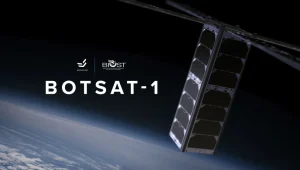Bulgarian cubesat specialist EnduroSat announced on July 3 its collaboration with Botswana International University of Science and Technology (BIUST) to develop Botsat-1, Botswana's inaugural satellite. The partnership will see engineers from BIUST join EnduroSat's team in Bulgaria to work on the three-unit (3U) cubesat, scheduled for launch aboard SpaceX's Transporter-13 rideshare mission in February.
“Botsat-1 will be equipped with a hyperspectral sensor to collect ground composition data crucial for Botswana's mining and agriculture industries,” EnduroSat stated.
Botswana, recognized as the world's leading producer of diamonds by value, faces economic pressures to diversify amidst fluctuations in global diamond markets, which contribute significantly to its GDP.
EnduroSat views Botsat-1 as a cornerstone in developing Botswana's space capabilities, aligned with its efforts to establish a space hub in the country. The initiative is bolstered by EnduroSat's newly established Master's Program in Space Engineering & Technology, though specific details were not disclosed.
Engineers from BIUST will contribute to the final assembly and payload integration of Botsat-1 in Sofia, while also managing satellite operations locally through EnduroSat's software.
“This partnership advances our shared vision and demonstrates our joint commitment to advancing space technology in Botswana,” remarked BIUST vice chancellor Otlogetswe Totolo.
EnduroSat, having deployed its first satellite in 2018 and delivered over 50 spacecraft to date, underscores the increasing accessibility of space technology to a wider range of countries.
The development of Botsat-1 coincides with a trend of more affordable and adaptable satellite solutions, enabling nations like Botswana to enter the global space arena traditionally dominated by wealthier countries.
In a similar move, Senegal is preparing to launch its inaugural satellite later this month through SpaceX's Transporter-11 rideshare mission.
